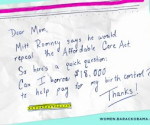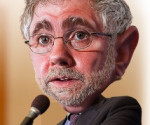Krugman, College, and the Higher Education Bubble
Paul Krugman claims (implausibly) that he was the first (or one of the first) economists to point out that the hot housing market really was a financial bubble. Of course, Krugman two years earlier had claimed that Alan Greenspan would have to create a housing bubble in order to revive the economy. (Krugman claims that he was just being tongue-in-cheek, and I will let readers decide for themselves.)
In 2004, Mark Thornton wrote:
Signs of a “new era” in housing are everywhere. Housing construction is taking place at record rates. New records for real estate prices are being set across the country, especially on the east and west coasts. Booming home prices and record low interest rates are allowing homeowners to refinance their mortgages, “extract equity” to increase their spending, and lower their monthly payment! As one loan officer explained to me: “It’s almost too good to be true.”
In fact, it is too good to be true. What the prophets of the new housing paradigm don’t discuss is that real estate markets have experienced similar cycles in the past and that periods described as new paradigms are often followed by periods of distress in real estate markets, including foreclosure sales, bankruptcy and bank failures.
Granted, Thornton is from the Austrian School, so he can’t possibly know anything about economics or what happens when the Fed forces down interest rates. And given that Austrians are so ignorant about everything, I will use another Austrian, Doug French, to give a counterpoint to Krugman’s latest missive about higher education.
Krugman’s latest column attacks Republicans for questioning ANYTHING about higher education, claiming that anyone who might have such thoughts is championing ignorance. I hate to say it, but it is not just the Republicans who are asking some serious questions about what is happening and whether or not our system of higher education is sustainable.
Krugman writes:
Here’s what the candidate told the student: “Don’t just go to one that has the highest price. Go to one that has a little lower price where you can get a good education. And, hopefully, you’ll find that. And don’t expect the government to forgive the debt that you take on.”
Wow. So much for America’s tradition of providing student aid. And Mr. Romney’s remarks were even more callous and destructive than you may be aware, given what’s been happening lately to American higher education.
I hate to say it, but most “student aid” is in the form of loans, and when one takes a student loan, their is no divorce from it until every farthing is repaid. (Student loans cannot, by law, be figured into bankruptcy proceedings, so if one owes huge amounts of money and cannot pay it back, tough luck. The government will make your life miserable, and in a recent case in California, government agents literally sent a SWAT team to a house where a man’s estranged wife was behind on her student loan payments.)
Krugman goes on to blame Republicans and anyone else who refuses to submit to the fantasy that state governments can continue to spend at Krugman-approved levels, including continuing payments to public colleges and universities at pre-depression levels. However, because he claims that the only thing that is needed solve the problems of higher education is for taxpayers to throw more money at it, he ignores the real underlying financial crisis that involves higher education.
Doug French knows otherwise. In a recent article, he takes on what he calls the “Higher Education Bubble” and throws cold water on the fantasies that Krugman is trying to weave. He writes:
Like all booms, higher education has been fueled by credit. In June of last year, total student-loan debt exceeded total credit-card debt outstanding for the first time, totaling more than $900 billion.
All of this credit has pushed the average cost of tuition up 440 percent in the last 25 years, more than four times the rate of inflation. But while the factors of production on campus have been bid up, just as they are in any other asset boom, the return on investment is a bust. In 1992, there were 5.1 million mal-employed college graduates. By 2008, the number was 17 million.
With Krugman, the answer is simplistic: throw more money into the higher education fire and out of it will appear a wonderful, golden calf.
French, on the other hand, sees the trends and the hard numbers to boot. And while Krugman might claim to have been a prophet on the housing bubble, he clearly is blind to what is happening in higher education. And when someone tries to point out the realities, Krugman does what Krugman always does: he makes insults and partisan statements.
I will go further: higher education really has become a consumer good instead of a producer’s good for many people. As a college professor, I can attest to that last statement, as much as I wish that Krugman were correct. But he is not.
Check out the “Krugman in Wonderland” posts here the Disptach – click here
William L. Anderson is an author and an associate professor of economics at Frostburg State University in Maryland. He is also an adjunct scholar with the Mackinac Center for Public Policy as well as for the Ludwig von Mises Institute in Alabama.
Read more at “Krugman-in-Wonderland”














